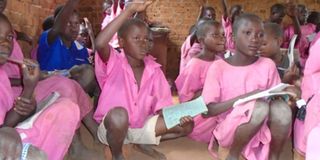Primary school teachers too deserve good salaries

In human growth and development a child’s brain is empty at birth. The brain grows and develops as a child passes through nursery, primary and secondary school almost up to the age of 18 years.
These levels were designed by psychologists, educationists, planners and many researchers to have a tailored education system. That is why all students in the faculty of education of any institution or university sit together when studying Psychology, History, Foundations of Education and other units regardless of their respective teaching subjects.
In Uganda, before a pupil sits Primary Leaving Examinations, they must have studied four compulsory subjects (Maths, English, Social Studies, and Science).
The teachers at this level struggle to ensure that a pupil is prepared well and given enough knowledge and capacity to pass PLE and qualify for the next level.
In many primary schools more than six teachers are in-charge of one pupil that is why some are privately employed yet in most schools the number of pupils is more than 80 per class.
So, apart from being a strong foundation, primary education is also a cornerstone for other levels of education.
In John 14:6 Jesus said He is the way and no one will go to the Father unless through him. This means that according to the education system in Uganda, no one can attain any further profession without the inputs of primary teachers. So they are essential.
At secondary level, a student sits nine to 10 subjects of which seven are core and compulsory. These are Maths, English, history, geography, physics, chemistry and biology. Then they add on two to three subjects from the electives. This obviously means that by combining arts and science subjects and making them core, a student’s brain continues to grow towards maturity and prepares them for proper future decision making for a profession of his or her choice from a variety of knowledge and their applicabilities.
Today, all teachers in secondary schools are implementing a new curriculum which is competence based. This is good because it is designed and drawn from a variety of models from developed and emerging countries here in Africa, Europe and Tiger countries.
With this new curriculum a student must do a project in every subject registered to sit and scores must be sent to Uneb before U.C.E exams.
It also enables a student to acquire and apply the knowledge and understanding, get skills, values and develop positive attitudes (KUSIVA) and that is a holistic student. So, there is no way to implement this competence based curriculum without the inputs, creativity, guidance and involvement of teachers.
Today again, in secondary schools, the directorate of industrial training requires all students to have hands-on training in the different vocational subjects. These are art and design, entrepreneurship, performing art, agriculture, ICT, food and nutrition, physical education, information and communication technology. This is also a good initiative because it changes the mind set of stakeholders, Students and the entire population from what a student will be to what that student can do at each level. But it is again the duty of teachers to make this a reality. In fact there is more work than ever.
A teacher is a change agent and in order to change others he or she expects to enjoy visible and invisible benefits of which increased salary is the best motivation. A motivated teacher develops positive attitudes, loves his work, becomes creative, readiness is high, is self driven and makes good delivery in class. He also records and makes follow-up of each individual student’s competences and achievements in and outside class. But the demotivated teacher can easily do the opposite.
Human needs and wants can not be solved by science and technology only. They are solved by a combination of creativeness and skills from science and arts. Today any science discovery, creativity or innovation ends up as business. All government institutions, companies and even the University of Mbarara of Science and Technology employ both Science and Art professionals.
Therefore, a teacher is both a source and a resource who should be protected, facilitated and helped especially at this moment when he/she is pressed between a rock and hard place. Teachers at school do many things together in the spirit of brotherhood and being duty bound. So, there is no need to belittle, demoralise, divide or intimidate them. If government negotiated with Kony the murderer, how and why does it fail to negotiate with teachers the developers and essentials?
Ddembe Emmanuel Kalanda.
Entrepreneurship teacher.




